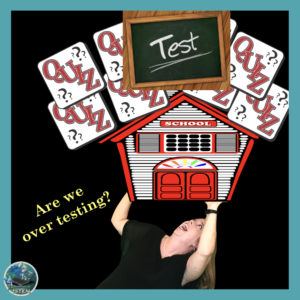Tests, tests, and more tests. Do you sometimes feel like all we do is test. Between quizzes, unit assessments, quarterly tests, semester finals, and state testing it seems like students spend one third of their school time testing. They are told that they need to make sure that they are meeting their A-G requirements so that they can get into college. They are told to take more AP classes. They are told that they need to get A’s in order to be competitive and get into the college they want. All this just leads to kids feeling more pressure, more anxiety, and more feelings of being failures. I have had students that have gotten upset because they had an A- and didn’t think that was good enough. I have had students miss school because the anxiety of being the top in the class was to overwhelming. I have known students who have given up after getting a C on a major test because they would loose their 4.0 GPA and felt they would not get into the school of their choice after that.
As teachers we are told that our students need to be at a certain level by the time they leave our class. It doesn’t matter what level they start, they all need to be mastering all of our subjects standards by the time they leave. Some states put so much emphasis on this that amazing teachers that can raise students by three grade levels are told that they are poor and ineffective teachers because raising the students three grade levels is not enough when those students need to jump four or five grade levels just to be at standard.
Is this what the focus of school should be? Should it really only be about teaching the standards, preparing the students for the high stake tests, and focusing solely on the academics. In my opinion No. In fact its a loud NO!
School should be a place where students can develop their creativity. It should be a place where students are allowed to take risks and fail and learn from those failures. It is a place where they learn how to socialize both in person and online. It is a place where they build their problem solving skills. It should be less about testing and more about growing. So many times the focus is on sending students to college. Not every student needs to or wants to go to college. Students should not feel that they have to go to college in order to be successful.
So what can we do to change this test focused, college is the only path, culture we are creating? Here are some steps we can take.
#1. Give less tests. Look at how many tests you are giving your students and try to eliminate 25% of them. That doesn’t mean you aren’t assessing them. You can still assess them and give your students feedback. I’m talking about the weekly tests that some teachers give. The small quizzes in a unit before the unit test. If you feel you still need them so that the students know how they are doing then consider not assigning a grade for them. Just have them take it as a formative to lead your instruction.
#2. Allow students to fix mistakes. Let students know that mistakes are a part of learning. Allow them to improve their projects, to make test corrections, and then retake tests. I would even take it another step forward by allowing their grade to change completely, not just giving them partial credit for retakes. Consider the amount of learning that must take place in order for a student to change a D project into an A project. Or to change their grade from a 45% on a test to an 85%. That amount of self-motivation, self-determination, and self-guided learning should be rewarded.
#3. Offer student choice. Let them choose their own way to demonstrate that they know the topic. They will put more effort into a project that they want to do and are interested in than something that a teacher assigns. Consider the possibilities if you let them write their own children’s book about the topic, create a video about the topic, make a podcast, draw an infographic, or create and sing a song. The students will be creating what they like and in the process will be learning more about the topic.
What are some of your suggestions? Please leave your thoughts and ideas in the comments below.

